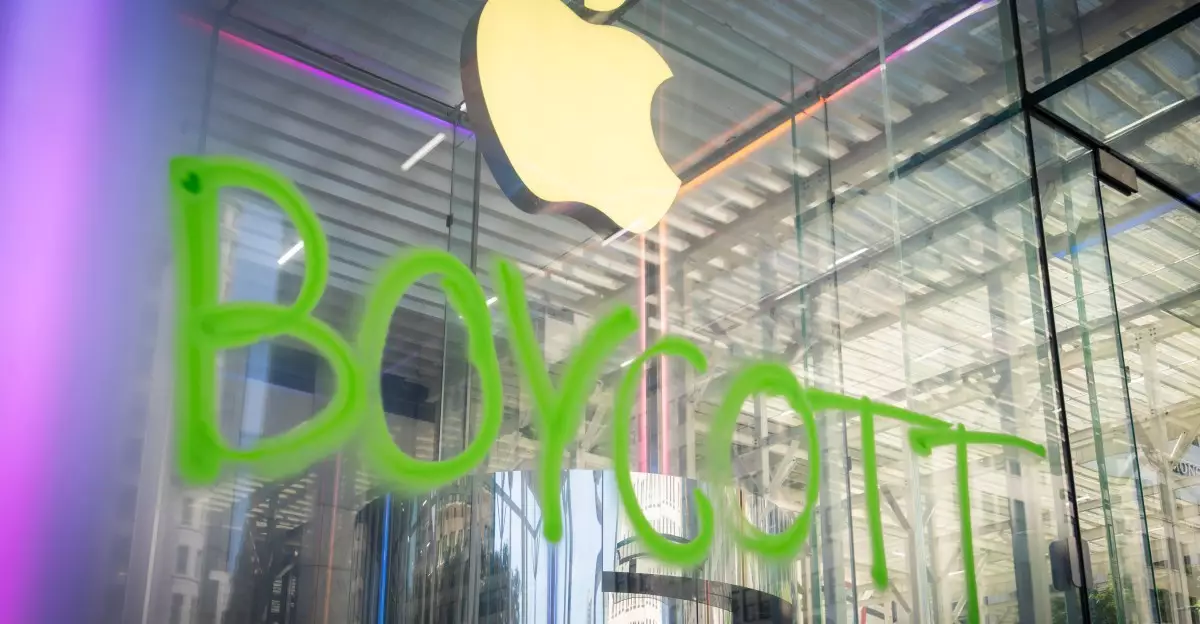The recent act of vandalism against Apple’s flagship store in New York City, carried out by Extinction Rebellion activists, underscores a broader sentiment of distrust and frustration towards Big Tech’s commitment to environmental sustainability. The spray-painted slogan “Tim + Trump = Toxic” boldly exposes a stark disconnect: corporate narratives touting environmental responsibility clash dramatically with their political alliances and financial contributions that undermine global climate efforts. Protesters are not merely challenging Apple but are signaling a deeper concern—that green promises often serve as marketing tools rather than genuine commitments. This act of civil disobedience, provocative and visceral, aims to pierce through the sanitized veneer often presented by corporations claiming sustainability while engaging in practices that contribute to climate degradation.
Corporate Hypocrisy and Political Alliances
The crux of the protest hinges on the troubling relationship between Big Tech executives and controversial political figures like Donald Trump. Despite public statements about supporting climate action, these individuals have paradoxically aligned themselves with administrations that actively dismantle environmental regulations. Extinction Rebellion’s pointed attack—highlighting Tim Cook, Sundar Pichai, and Mark Zuckerberg’s participation in Trump’s inauguration—serves as a wake-up call to consumers worldwide: behind the glossy advertisements and CSR reports lies a buying of political influence that perpetuates harm. By supplying billions to fossil fuels and relaxing environmental protections, these corporations betray the very ideals they claim to champion, revealing profits and political expediency as more powerful than planetary health.
Environmental Impact Amidst Technological Growth
Beyond political alliances, the protest brings to light another uncomfortable truth: the environmental cost of technological expansion, especially AI and data centers. The surge in energy demands from AI development — with Google and Microsoft leading the way — threatens to negate any carbon reductions achieved in other areas. The fact that Google’s emissions increased by 11% last year is a sobering indicator that progress on sustainability is fragile at best. As the tech industry accelerates its reliance on powerful AI, the energy consumption risks escalating beyond manageable proportions, reminiscent of Bitcoin’s notorious power hog status. These developments suggest that technological innovation, often heralded as a solution to climate change, may paradoxically become part of the problem.
The Myth of Corporate Climate Leadership
While executives like Tim Cook publicly declare climate change a “priority,” their actions tell a different story. This disconnect is emblematic of a broader pattern within the corporate world: leveraging climate rhetoric for branding, while lobbying against legislative efforts that could curb emissions. The disparity between speech and action raises ethical questions—can we truly trust companies that publicly advocate for sustainability yet quietly finance policies and politicians that roll back environmental protections? The protest calls into question the sincerity of corporate climate commitments—are they driven by a genuine desire to effect change, or are they merely strategic opportunism in a world increasingly scrutinizing corporate morality?
The Danger of Greenwashing in a Crisis-Laden World
This activism reveals an urgent need to scrutinize what constitutes genuine sustainability. The facade of corporate responsibility often masks a pattern of greenwashing—where environmental initiatives are superficial, designed more to appease consumers than to create substantial change. With climate crises intensifying and global policies lagging behind, the disconnect between corporate rhetoric and reality exacerbates public disillusionment. Activist protests like these serve as vital reminders that accountability must extend beyond surface-level commitments; real climate progress demands transparency, political integrity, and a willingness to confront systemic issues within the industry.
The act of spray-painting “Toxic” on Apple’s storefront and shouting accusations at tech executives starkly illustrates the growing impatience and anger of a society fed up with hollow promises. It provokes a visceral reaction, forcing us to confront uncomfortable truths: that corporate sustainability efforts are often gilded façades crafted to preserve brand image and market share. As consumers and citizens, we must demand more than words—we need unwavering accountability, genuine commitments, and a willingness from corporations to decouple their growth from environmental destruction. The fight for our planet’s future isn’t just about policies or protests; it requires a fundamental reassessment of whose interests truly matter in the age of climate collapse.

